On the road in Serie D: 4th Division Trastevere flying high in Italy’s soccer lowlands
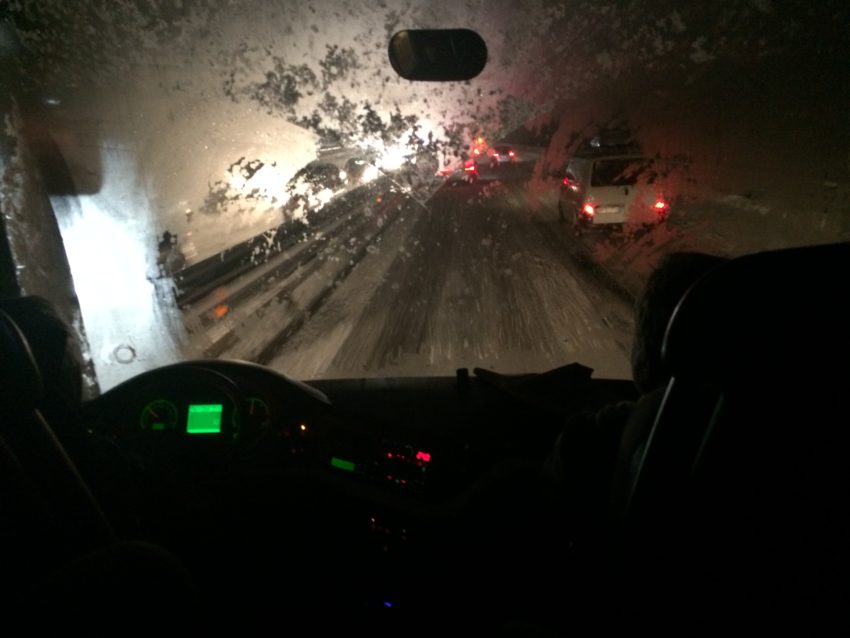
SAN SEVERO, Italy — Stefano Tajarol has seen every inch of Italian asphalt from the seat of a bus.
His 35-year-old face is weathered, in kind of a rugged Italian sort of way. He has a perpetual scruffy beard. Lines are forming around eyes that have seen too many patchy soccer fields, tiny towns and lonely roads.
Stefano Tajarol has the look of Serie D.

This is the bottom branch of Italy’s soccer tree, hanging just above the rubble of amateurism. Serie D has 162 teams spread from rural Sicily to the foothills of the Italian Alps. Francavilla. Ghivizzano. Darfo Boario. They are towns you’ll never see in a guide book. They’re all trying to climb atop one of nine divisions for promotion to Lega Pro, Italy’s third division where there are higher salaries, historic stadiums and — gasp! — television.
On a Saturday morning just north of freezing on a hill high above Rome, Tajarol stands in a stadium parking lot staring at history. We’re not talking about the Colosseum or Vittoriano, which can be seen from a romantic vista not far away. Tajarol is the veteran face of ASD Trastevere Calcio, Rome’s main Serie D team that’s on the verge of a dream few in this soccer-mad city know about.
At the halfway point of the season, Trastevere is in first place in Girone (or Group) H with 11 wins, four ties and two losses. If it finishes first, it will reach the third division for the first time in 69 years and second time in its history.
ASD Trastevere began in 1925.
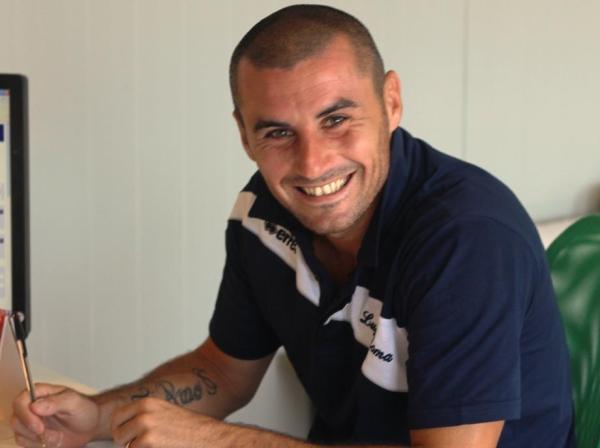
Tajarol has climbed through the ranks of Italy’s mulberry bush of amateur classifications and has tasted Lega Pro. Along the way, he has also been a truck driver, worked in a factory and in an informatics company. This season, however, things are different.
“Only for this year, at 35 years old, it seems strange but right now I don’t have a job,” he says
Tajarol is putting all his time and effort into lifting Trastevere to glory. Up to now, Rome knows only two things about the club: One, it’s where A.S. Roma icon Francesco Totti spent two seasons of his youth career; two, Trastevere’s coach, Sergio Pirozzi, is also the mayor of Amatrice, the town outside Rome buried by the August earthquake that killed 300 people.
The drive to the finish begins on this freezing morning when they head to San Severo in Puglia for a game the next day. I am joining them. It’s a precarious road trip, not only because eighth-place San Severo has a strong, veteran lineup but the forecast is for snow. Six games in Girone H were already postponed. We don’t even know if we’ll get through Abruzzo, the mountainous region bordering Puglia.
After we settle in the bus, the owner boards for a getaway pep talk. Pier Luigi Betturri is best known for owning Carlo Menta, the massively popular restaurant in the Trastevere neighborhood down the hill from their stadium. He has been peppered with questions about what he’ll do about the club’s tiny 800-seat stadium, er, playing field, with seats on only one side, if they get promoted. He’ll worry about that if they get there.
Distinguished looking with a full head of jet black hair, Betturri grew up in Trastevere. Last year he opened a club souvenir store in the neighborhood. He’s a hands-off owner, more Paul Allen than Jerry Jones, minus a few billion. He’s soft spoken and more into results than PR.
He stands in front of the bus and tells the team what is at stake in the coming months. Despite the lower level, Girone H is very balanced. Only six points separate the top five teams. “A tie is like a loss,” he tells them. The players applaud him as he leaves to follow them in his car.
I traveled as a sportswriter for 40 years covering major college basketball and football, the NFL’s Denver Broncos and Major League Baseball. I rarely traveled WITH a team. American sports teams charter flights and buses. I followed them in economy seating and rental car.
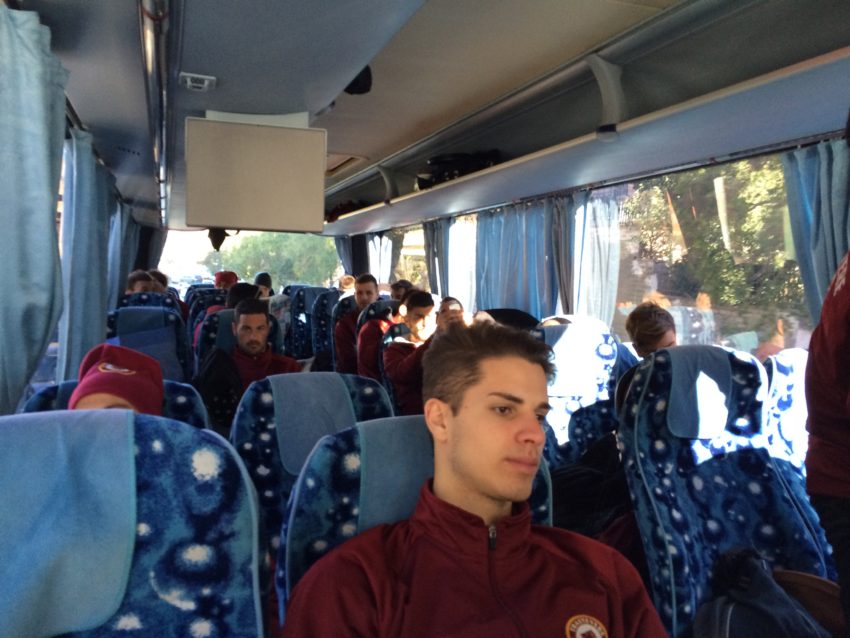
On this trip I see it all, from the candid conversations of a five-hour bus ride to what they eat. Trastevere is one of the youngest teams in Girone H. Its average age is 23, just barely above an American college team. They have seven players under 20, including star 18-year-old goalkeeper Andrea Radaelli. After the game, I wonder if we’ll all go out for gelato.
I make my first mistake when I take a seat near the back of the bus. I have to move to the front, I’m told. Ever since they’ve all sat in the same seats, they haven’t lost. I quickly move up front by the club’s braintrust: Aldo Gardini, the bald, upbeat coach promoted to fill in for Pirozzi; Andrea Calce, the burly sporting director; Morgan Croce, their bald, fit goalkeeper coach; and Vincenzo Faraci, the team manager who has spent 15 years in Serie D and Eccellenza, the amateur level one rung lower, handling logistics on road trips. On the bus only Croce, Garaci, ANSA sportswriter Alessandro Castellani — and myself — speak English.
It’s not hard to translate an angry soccer team, though. They immediately start booing when they insert a movie: “One Flew Over the Cuckoo’s Nest.” Release date: 1976.
“We are a young team!” one yells from the back. “You can’t make us watch a movie that’s 100 years old!”
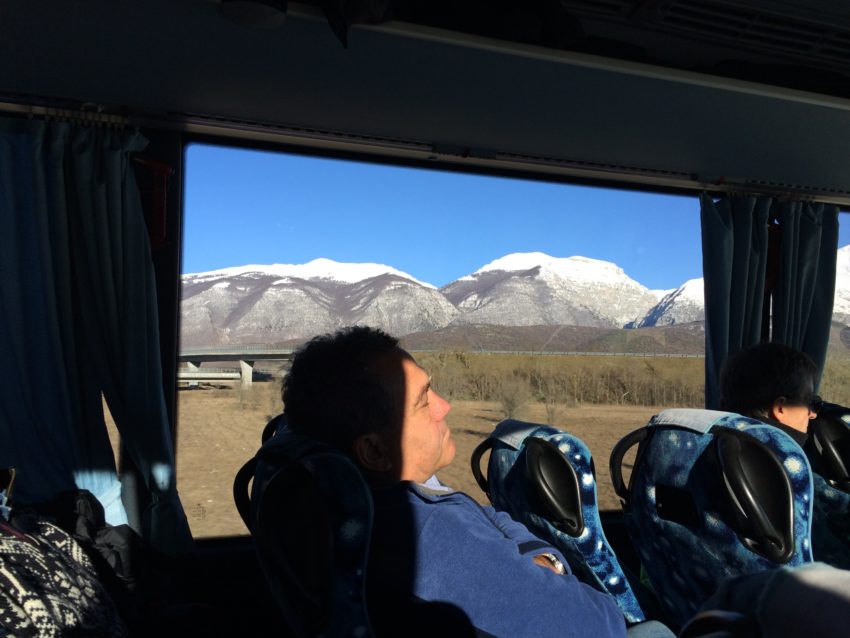
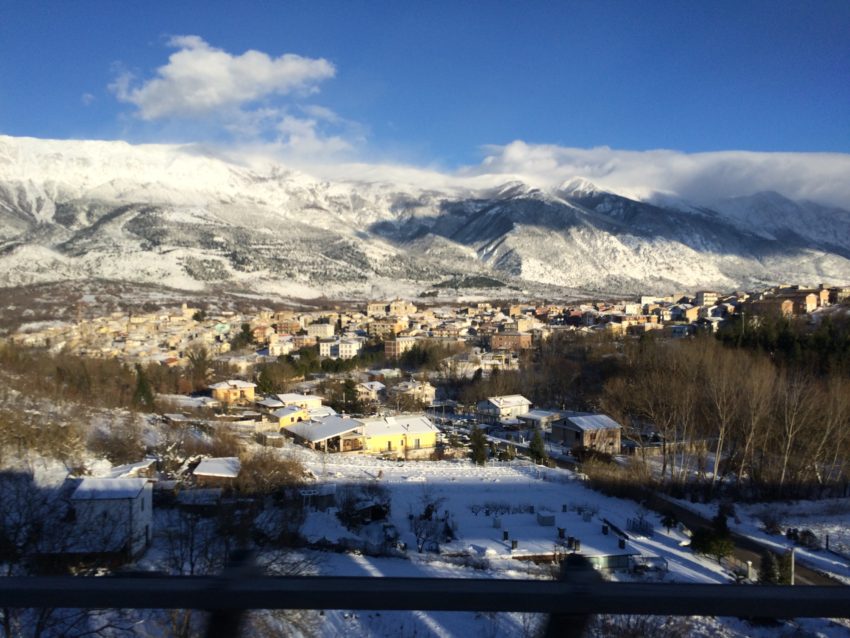
Making matters worse, it’s in English. Fortunately for them, the movie breaks down and we’re left watching the magnificent Italian countryside go by. Always as beautiful as a Da Vinci landscape painting, rural Italy is even prettier in the snow with a white blanket on farms and grapevines dripping with ice. Above us, Abruzzo’s Apennines Mountains are covered in snow. We’re driving between five-foot snowbanks. I don’t feel like I’m with an Italian soccer team. It feels like a road trip in the Western Hockey League.
The players are surprisingly quiet. Radaelli looks studious in his glasses and freshly shaven face while glued to his iPhone. I chat with Croce about life in Italy’s bush leagues. Last season, Trastevere was in Girone G which included Sardinia and Tuscany. Girone H reaches deeper into Southern Italy where soccer fanaticism reaches dangerous heights.
“In some towns in Southern Italy, the football team is all they have,” Croce says. He tells me that the following weekend, Nocerina will try to bring about 1,000 of its notoriously vicious fans from Nocera, in Campania south of Naples, to Trastevere’s little Campo Vittorio Bachelet. Fans in Southern Italy have been known to find opposing teams’ hotels and make their presence — and their drums — known outside the opponents’ windows.
I wonder if this is why we drive right through San Severo, past the Mussolini-era stadium and continue 18 miles to Lucera for the team hotel. However, after all, this is an Italian road trip. So Lucera is one of the endless number of charming towns dripping in history. Destroyed twice by the Italian civil war between Octavian and Mark Antony and by the Roman Emperor Constantius II, Lucera has a 2,000-year-old amphitheater, a medieval castle and a 700-year-old cathedral anchoring a vast piazza.
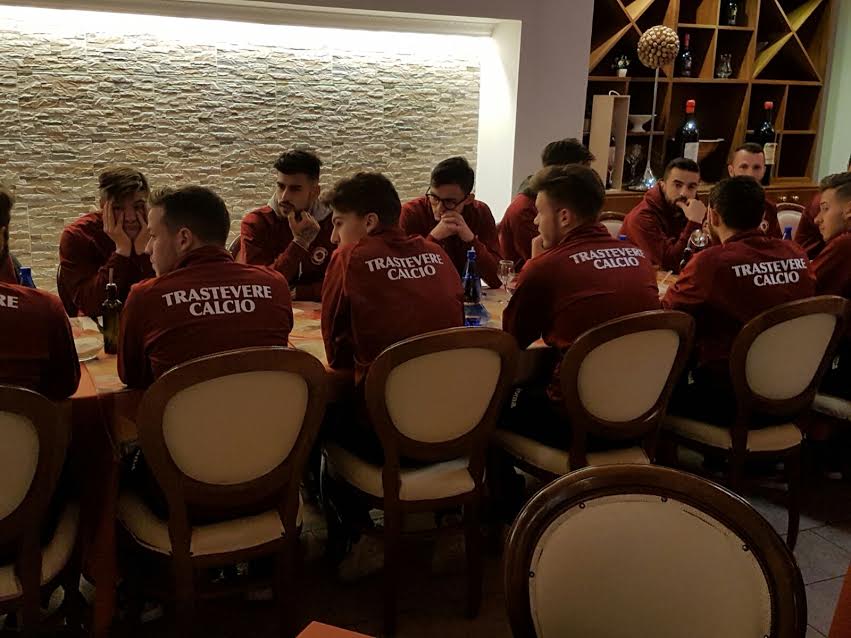
I walk through the giant arch leading into the old town and stop by a cafe for a coffee and cornetto. I don’t understand a word any of the old locals are saying. I ask the barista if they’re speaking Pugliese, the regional dialect.
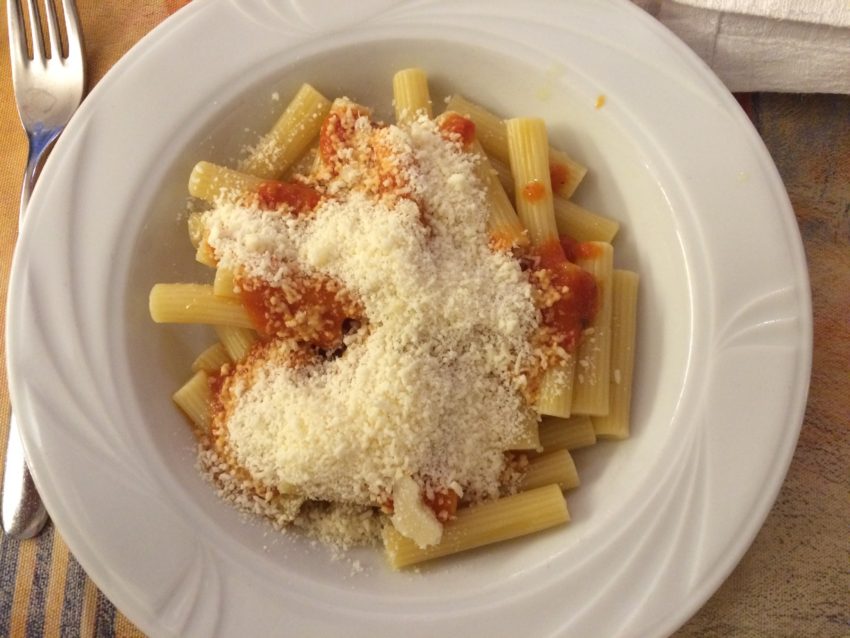
“No,” he says. “It’s Lucenese.” Oh, the dialect within the dialect. They have those in Italy.
“It sounds Arabic,” one old man says, in Italian for me.
“Or Albanian,” I reply.
“No,” he insists with a smile, showing the national disdain for Albanians. “Arabic!”
Back at the hotel, I couldn’t have found a better country to have the first team dinner of my career. The Villa Imperiale put out a meal worthy of an NFL team celebrating a Super Bowl win.
An antipasti spread of salami, cheese, bufala mozzarella, prosciutto. Multiple plates of pizza bianca followed by a Pugliese specialty: orecchiette con cime di rapa, ear-shaped pasta with turnip greens.
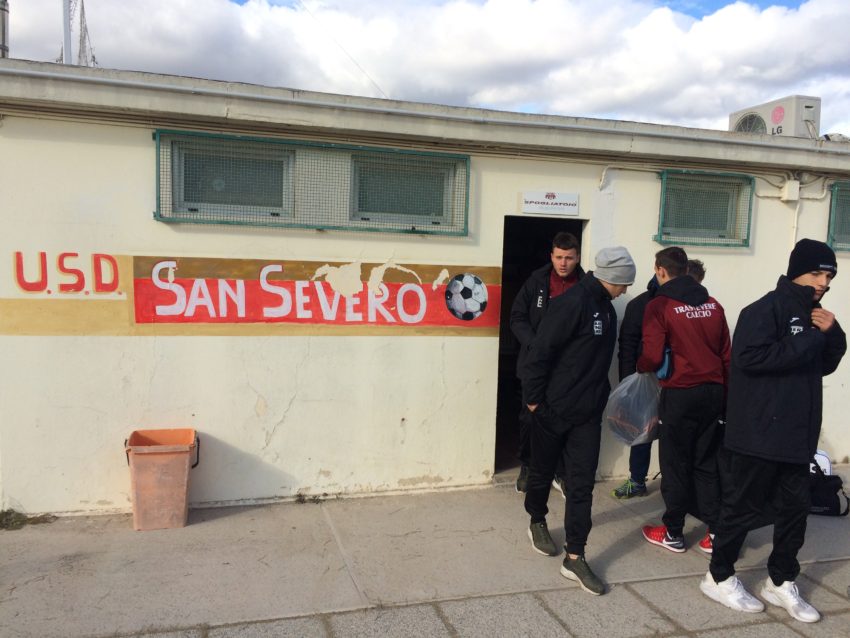
Then comes baked caciocavallo, Puglia’s signature white cheese. We had many bottles of Puglia’s Aglianico and Nero di Troia wine. However, that was for the staff and media. The players were still in training. They were stuck eating pasta with tomato sauce and a chicken breast.
It’s basically what we all ate the next morning together before heading over behind a police escort — of one car (this is Serie D, after all) — to San Severo. Keep in mind Puglia, the heel of Italy’s boot, has become an “in” place to visit in Italy. Off the beaten path, more than just urban Italians have discovered Puglia’s golden beaches, quaint villages and beautiful national parks.
San Severo is none of these things.
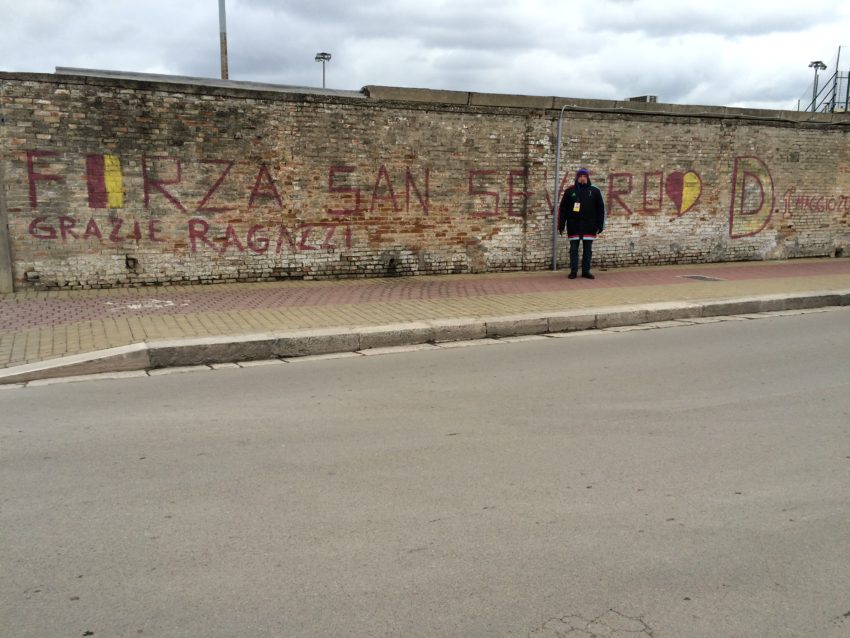
Located about 100 miles from the Adriatic Sea, San Severo’s most worthy historical note is it was the last pagan town in Italy to convert to Christianity in 536 and during World War II the U.S. used it as an airfield.
Drab and gray, San Savero had fascist-style Stadio Ricciardelli built when the club formed in 1922, two years before Mussolini took office. Four brick columns atop a brick wall brace one end of the stadium, marred all over the outside with fan graffiti.

Small grandstands seating 1,150 line one side and behind one goal. Crude, hand-painted signs indicate the locker rooms. Broken-down equipment pile up next to the crumbling concrete grandstand.
Munich’s Allianz Arena this is not.
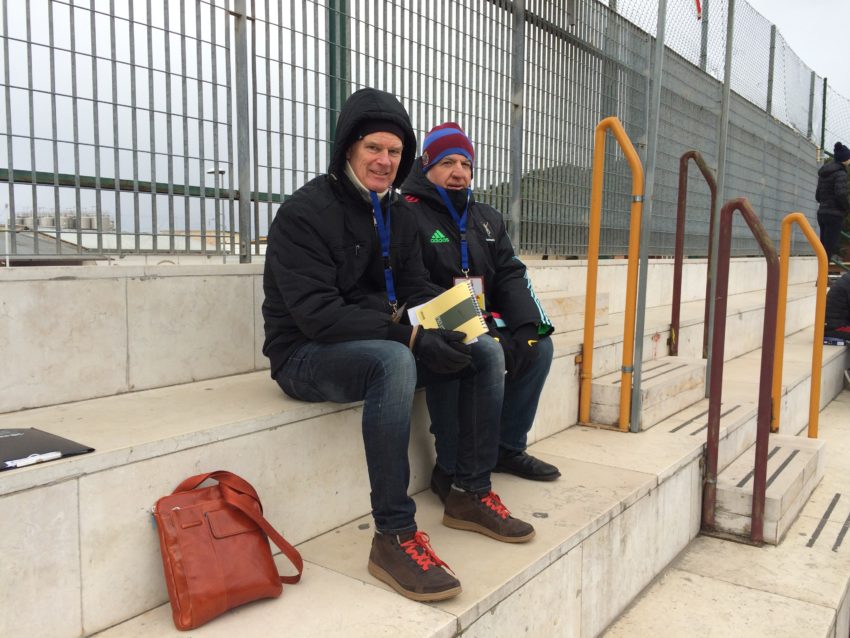
Ricciardelli’s “press” area consists of a small, simple tarp covering two seats on the top row of the grandstand. On this day, we need a glass-enclosed press box and brandy-carrying St. Bernards.
While the snows don’t reach past Abruzzo, Puglia remains bitterly cold. It’s 35 degrees, and a bitter wind off the Adriatic makes it feel 15. I wonder how long Trastevere’s players last before they leave and camp out in a cafe.
In Rome, when the temperature drops below 70 the populace dresses as if they’re mushing dogs over one of the poles.
The one I feel sorry for is Radaelli. Cold-weather sports events are often worse for the fans and press. The players constantly move. A goalkeeper does not.
He also has the added pressure as the last line of defense for Trastevere’s fledgling dreams.
After lunch at the hotel, I saw him huddling alone in quiet conversation with Croce, his coach. They end with Croce confidently patting him on the cheek and smiling.
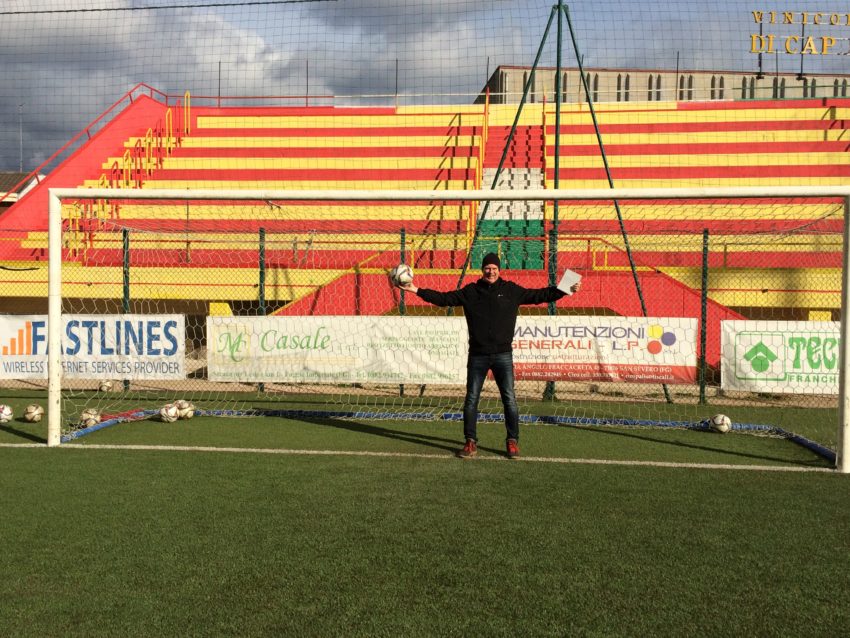
“I talked to him about comportment,” Croce says, “about the little things that are important.”
Shortly before kickoff, I see Radaelli pouring a cappuccino down his shorts. It is COLD!!!
This is almost like men versus boys. San Severo has five players at least 29, including Vito Falconieri who had a cup of coffee in Serie A with Catania in 2009.
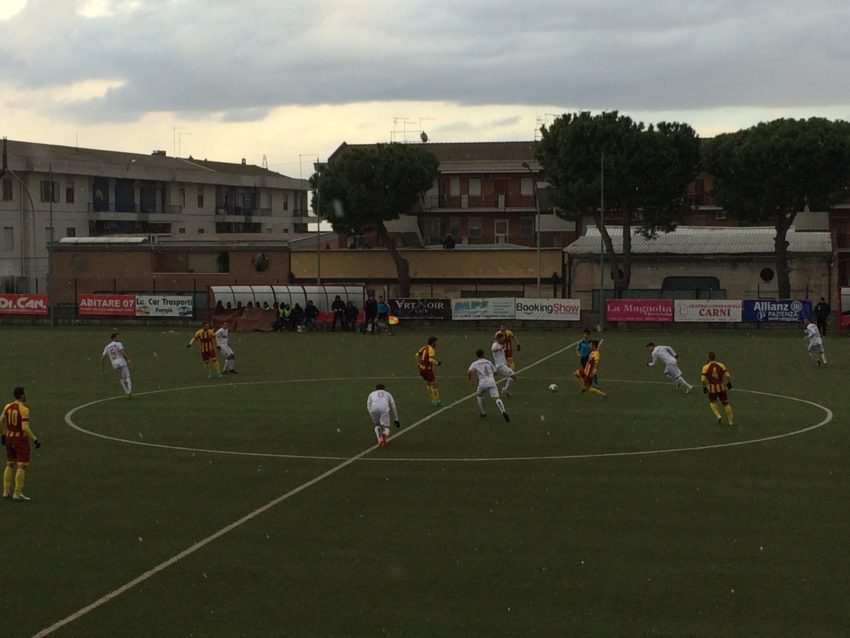
It’s right after kickoff, and the wind is playing havoc on the ball. In the first 30 seconds, a San Severo shot changes directions like a fly ball in old Candlestick Park. Radaelli deftly deflects it away. San Severo is dominating early. Trastevere’s passing is off target, and it can’t mount any attack. The squad doesn’t look sharp. Radaelli is under pressure. Not 10 minutes into the game, snowflakes begin to fall.
A small cluster of hardy San Severo ultras are singing songs and banging on drums behind the San Severo goal. Nicola Romaniello makes a nice diving stop on 20-year-old Davide Lorusso’s low shot. Trastevere is getting its footing and in the 33rd minute, Luca Panico, 19, makes a nice pass across the 18-meter box to a wide-open Lorusso and he shoots it under Romaniello for a 1-0 Trastevere lead.
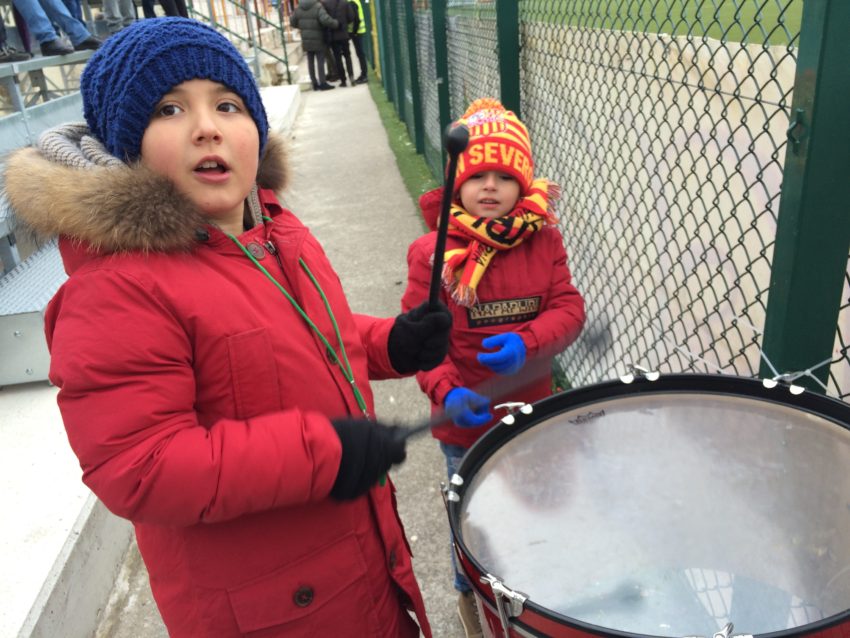
The lead and continued dreams of promotion last all of two minutes. San Severo has a free kick that clears the entire Trastevere defense. San Severo’s Andrea Lobosco out leaps everyone to head a soft shot just over the reach of Radaelli. He can only lay helplessly as it slowly rolls away and careens in off the inside of the goalpost.
I ask Croce what Radaelli did wrong, if anything.
“When the ball was in the air, he kept coming in, coming in,” he says. “Then he had to rush back. He should’ve stayed back.”
That’s how the game ends. The second half is 45 minutes of weather resistance. It’s fans and players fighting wind, snow flurries and each other.
Radaelli does make remarkable saves with his feet and a dive to protect the tie, and Trastevere seems satisfied to get out of San Severo without losing a game, not to mention a digit to frostbite.
“This was COLD!” says Gardini, the Trastevere coach, still shivering outside the crackerbox locker room. “It was too much, especially in the first half. I was freezing. So it was good to get a point because to play here is difficult for everybody.”
As the bus pulls out into the freezing darkness. I move back and sit next to Tajarol. I’m trying to get a feel for life in this dark, little-known corner of Italian soccer. The national dailies run 26-30 pages a day on soccer but only the occasional standings on Serie D. Only family, friends and small towns know people like Tajarol exist.
From the Rome neighborhood of Cinecitta, home to Italy’s famed movie studio, he’s been married eight years and has two children, ages 6 and 3. The average salary in Serie D is about 1,000 euros a month. Some vets, perhaps like Tajarol, get kicked a little extra. Before, he’d work jobs from 8 a.m.-1 p.m., then go train. No more.
“The salary is good and you can make ends meet,” he says in the darkness. “That’s my own choice to play only football now and dedicate myself entirely to football 100 percent. That’s what I want to do, at least another two years.”
I ask the difference between Serie D and Lega Pro.
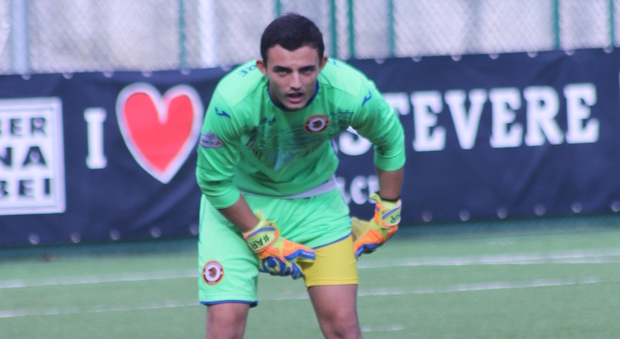
“There’s a greater physical difference on the pitch and there are other factors,” he says. “You play in more important stadiums. There’s a greater mentality and the mentality is more professional. You have to be careful, even after you train, after you play.”
Radaelli is back in his seat, looking at his iPhone. Goalkeepers are like relief pitchers. They must have a short memory. Acquired from Inter Milan’s youth ranks, Radaelli has one of the team’s brighter futures. His relatively short 6-foot height may be an issue but his age isn’t. Gianluigi Donnarumma, Milan’s starting goalkeeper, is 17.
Radaelli laments the goal he gave up. He could’ve done more but says, “Their player was very lucky.”
I ask him about life is a goalkeeper, a young goalkeeper. It’s a position where you can’t hide behind a hockey mask or helmet. His answer is remarkably mature, almost philosophical for an 18-year-old living alone 350 miles from home, trying to study and scratch out a living with his parents 350 miles away.
“You live both the joy and the defeat in a more exclusive way and a more detached way than the other players,” he says. “That’s why this position takes somebody with a strong personality because you’re always alone. Because you live everything alone, you have to manage all the situations alone. You can’t rely on your other teammates like the other players do. And your margin of error is equal to zero. If the striker makes a mistake, the result is the same.
“But if the goalie makes a mistake, it’s not the striker’s fault.”
A wild card game breaks up the quiet monotony of the snowy ride home. Finally reaching Rome, the bus’ stick shift breaks down a few miles from the team parking lot. I hurry out with the players and our bags as we race to the nearest bus stop. It’s life in Serie D, where dreams are built in broken down stadiums and buses.
But for Trastevere, the dream remains. This Sunday comes Nocerina. It not only has a great following but is a great team. It’s in second place, one point behind Trastevere.


January 14, 2017 @ 8:04 pm
A nice inside look into life in Serie D. Thanks. I have on occasion actually bet on this league as the payout can be quite good.
January 15, 2017 @ 12:59 am
Thanks, Jake. You bet on Serie D? That may be my next blog: soccer gambling in Italy. I lived in Vegas 10 years and I know where you’re coming from. The key to sports gaming is know just a little bit more than the bookies. The wise guys in Vegas bet one college basketball league or team all year. They know everything about those teams. The Ivy League is particularly profitable because road games aren’t as difficult and the teams are real consistent. Players are smart. They fly under the bookies’ radar. One year in the mid-80s I bet the Washington Bullets for about three weeks. They were a mediocre but veteran team that played real well on the road. I cleaned up until the bookies caught on and adjusted the line. DON’T bet the NFL. Bookies know what plays teams run before the teams do. Serie D may fit that category. Thanks for the idea.
January 15, 2017 @ 3:19 pm
…Thank you for your sweet, human and true point of view. It’s a pleasure for me have spend a lot o time with you! Morgan e Stefania
January 16, 2017 @ 1:55 am
You’re welcome Stefania. I’m pleasantly shocked I had a woman reader get through 2,500 words about a minor-league soccer team’s road trip.
John
February 16, 2017 @ 2:52 pm
Hi John. Do you manage to get to any of the Rugby games? Is rugby in Rome/Italy popular as the crowds in the Studio Olympica are quite large; or are the majority the visitors’ supporters?
May 3, 2019 @ 2:25 am
Great report.
December 23, 2019 @ 3:36 pm
I have been following a serie C team Virtus Francavilla for 5 years now Francavilla is my grandfather’s hometown. I was there in2018 and saw them play in Brindisi very exciting. I know follow C and D I loved your article
May 28, 2022 @ 1:57 pm
I am a fan of Italian football. Especially local football such as serie D and C. I am a owner of football team in Liberia. The home of football legend George Weah. We can do business together.
May 8, 2023 @ 11:05 am
What a great piece you’ve written there. Football is not glory and big fancy cars as you’ve clearly found out
Cheers, Bob (A Napoli fan in England)